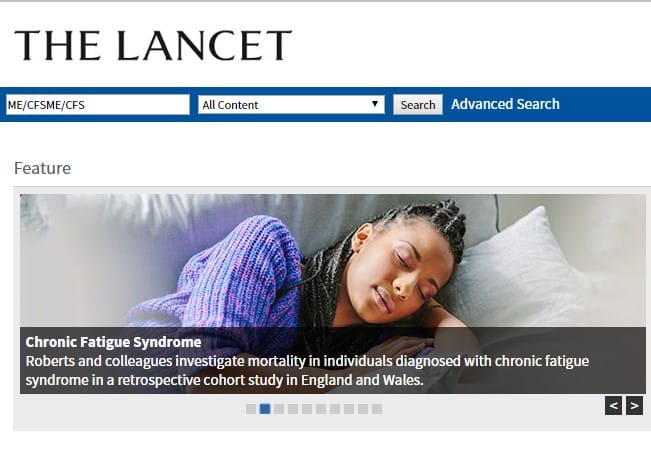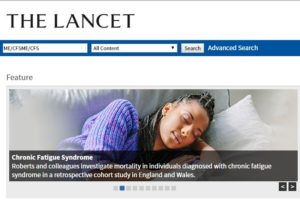This month, a new paper out of the UK investigating mortality in individuals diagnosed with Chronic Fatigue Syndrome was featured on The Lancet home page. Among its finding, the authors noted a significant increase in the risk of suicide among those with ME/CFS. The Bateman Horne Center offers advice on how to build emotional resilience.
The paper can be accessed in its entirety HERE
The Lancet has been in publication since 1823 and exists to apply scientific knowledge to improve health and advance human progress. It is a major contributor to health and medical media coverage worldwide. So while this study does not bring to light information unknown to the patient community, it is noteworthy that this is being recognized by the medical community and received front page listing in such a prestigious journal.
This is the first study to show a specific increased risk of suicide in a population of patients with chronic fatigue syndrome compared with the general population. There are limitations to the data including that, despite being the largest study of mortality in chronic fatigue syndrome available so far, the sample size is still modest. The researchers found that patients might not wish to be referred to mental health services or be assessed by a psychiatrist, largely due to perceived stigma of psychological and rehabilitation treatment, and some patients’ views that because their symptoms are biological any form of psychological treatment is not needed. Although suicide-specific death rates are higher compared with the general population, it is lower than for psychiatric disorders.
This study highlights the importance of adequate assessment of mood and other psychiatric symptoms when managing individuals with chronic fatigue syndrome. Dr. Bateman and the staff at BHC is incredibly sensitive to the emotional impact felt by someone impacted by a chronic illness like MECFS and FM. In concert with medical treatment and advice, the staff at BHC works with patients to build emotional resilience and offers this advice:
Building emotional resilience
From day one of illness onset, it’s bad news. People around an individual struggling with MECFS/FM may not understand the illness, how it feels or what to do about it. There might be a flurry of medical attention at first, but as months go by without the kind of physical improvement people expect, those who once offered support may disappear. The ongoing physical limitations are accompanied by ongoing emotional trials—grief, worry, and discouragement. An acute illness is definitely traumatic, but most can muster a good fight while actively seeking a diagnosis and some type of rescue care. It is the chronic unrelenting nature of the illness that really gets old.
MECFS or FM can be especially punishing compared to other chronic illness. Because the symptoms are difficult to measure or prove clinically, they may be met with doubt or disapproval by those whose support is needed most. Because the illness can follow a relapsing and remitting pattern, in addition to feeling limited most of the time, patients often can’t predict when they’ll feel better or worse. Because of the characteristic post-exertional relapse of MECFS or pain escalation of FM, an honest effort to function or simply have a little fun is often punished mercilessly by a relapse of pain, fatigue, brain fog, sleep dysregulation or worse.
There are innumerable personal losses in the present and potential losses projected far into the future. Focusing on the loss can lead to a downward spiral that can impact life in very tangible ways. In order to thrive, anyone living with these illnesses must repeatedly rejuvenate the will to live and to find joy in living, even while chronically ill. It can be done! No one and no disease can take away the freedom to choose how to respond to a difficult situation.
MECFS/FM patients need support in the form of strong advocates and cheerleaders when the going gets tough. Patients with a good support system in place do better over the long term because having advocates and cheerleaders builds up their emotional resilience and helps them to develop insight. This kind of support also helps them learn how to get out of an emotional slump, calm paralyzing fears, and to get back up and take one step forward. It is important for them to cultivate the resources needed—among family, friends, counselors and medical providers—to stay as positive as possible. Remember that much of what is known about MECFS/FM physiology is centered in the brain, and brain physiology responds strongly to the mind. Emotional resilience can help lead to physical resilience.
Additional resources:
- https://www.tonibernhard.com/ An award-winning author and blogger about living well with chronic illness and pain
- Thomas G. Harrison, LCSW, MFT, a mental health professional who works with patients with chronic disease and a person living with ME/CFS since 1989 – two related presentations on coping within healthy limits with chronic illness.
- Lee Smith, M.D. presented at a BHC (OFFER Utah) educational meeting on stress resilience
- https://www.cfidsselfhelp.org/library A library of articles on coping strategies, emotions, family and friends, relationship and support, stress management and more.
- https://www.nlm.nih.gov/medlineplus/copingwithchronicillness.html Resources from the US national library of medicine
- https://www.apa.org/helpcenter/chronic-illness.aspx Resources from the American Psychological Association
If you or someone you love are having thoughts of suicide, please get help today.
National Suicide Prevention Lifeline
1 (800) 273-8255
Hours: 24 hours, 7 days a week
Languages: English, Spanish
Website: www.suicidepreventionlifeline.org


 Lucinda Bateman, MD, is a renowned clinician, researcher, and educator. Her Johns Hopkins University Medical School training instilled an approach to care that she has employed throughout her career - the patient comes first and the unknown or unexplained does not equate to a lack of proper and compassionate care. Since starting her own practice in 2000, she has served on six boards or committees, been the principal investigator for 45 studies, authored/coauthored 40 journal articles, served as adjunct instructor and adjunct assistant professor in the University of Utah Departments of Preventative Medicine, Internal Medicine, and Anesthesiology, and lectured around the world.
Lucinda Bateman, MD, is a renowned clinician, researcher, and educator. Her Johns Hopkins University Medical School training instilled an approach to care that she has employed throughout her career - the patient comes first and the unknown or unexplained does not equate to a lack of proper and compassionate care. Since starting her own practice in 2000, she has served on six boards or committees, been the principal investigator for 45 studies, authored/coauthored 40 journal articles, served as adjunct instructor and adjunct assistant professor in the University of Utah Departments of Preventative Medicine, Internal Medicine, and Anesthesiology, and lectured around the world.